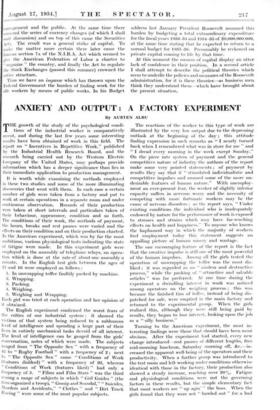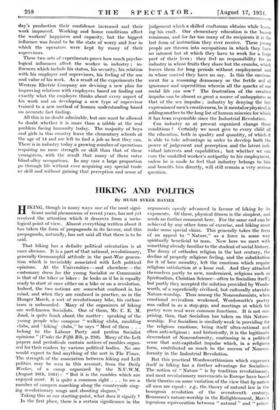ANXIETY AND OUTPUT: A FACTORY EXPERIMENT
By AUSTEN ALBU
THE growth of the study of the psychological condi- tions of the industrial worker is comparatively recent, and during the last few years some interesting results have been obtained of work in this field. The report on "Incentives in Repetitive Work," published by the Industrial Health Research Board, and the research being carried out by the Western Electric Company of the United States, may perhaps provide information which has a deeper significance than lies in their immediate application to production management.
It is worth while examining the methods employed in these two studies and some of the more illuminating discoveries that went with them. In each case a certain number of girls were taken from a factory and put to work at certain operations in a separate room and under continuous observation. Records of their production were taken at short intervals and particulars taken of their behaviour, appearance, condition and so forth. The conditions of their work, the methods of payment, the hours, breaks and rest pauses were varied and the effects on their condition and on their production charted. In the American experiment, which was by far the most ambitious, various physiological tests indicating the state of fatigue were made. In this experiment girls were employed on the assembly of telephone relays, an opera- tion which is done at the rate of about one assembly a minute. In the English test girls between the ages of 15 and 16 were employed as follows : 1. In unwrapping toffee faultily packed by machine.
2. Wrapping.
3. Packing.
4. Weighing.
5. Weighing and Wrapping.
Each girl was tried at each operation and her opinion of it obtained.
The English experiment confirmed the worst fears of the critics of our industrial system : it showed the victims of that system being reduced to a subhuman level of intelligence and spending a large part of their lives in entirely mechanical tasks devoid of all interest. The level of intelligence can be gauged from the girls' conversation, notes of which were made. The subjects ranged from "The Opposite Sex" with a frequency of 42 to "Rugby Football" with a frequency of 2; next to "The Opposite Sex" came "Conditions of Work (features disliked) " with a frequency of 82, whereas "Conditions of Work (features liked) " had only a frequency of 5. "Films and Film Stars" was the third among a range of subjects in which "Girl Guides" (the firm organized a troop), "Gossip and Scandal," " Suicides, Murders and Accidents," " Clothes " and "Dirt Track Racing" were some of the most popular subjects. The reactions of the worker to this type of work are illustrated by the very low output due to the depressing outlook at the beginning of the day ; this attitude finding expression in such remarks as " I nearly turned back when I remembered what was in store for me" and "I dread every morning in the week except Sunday." On the piece rate system of payment and the general competitive nature of industry the authors of the report make some very pointed statements ; of payment by results they say that it " stimulated individualistic and competitive impulses and aroused some of the more un- desirable features of human nature." With unemploy- ment an ever-present fear, the worker of slightly inferior capacity suffers in nervous worry and the necessity of competing with more fortunate workers may be the cause of nervous disorders ; as the report says, "Under existing conditions the individual who is inadequately endowed by nature for the performance of work is exposed to stresses and strains which may have far-reaching effects on health and happiness." To anyone who knows the haphazard way in which the majority of workers find employment today this statement suggests an appalling picture of human misery and wastage.
The one encouraging feature of the report is the fact that the creative impulse is still one of the most powerful of the human impulses. Among all the girls tested the operation of unwrapping the toffee was the most dis- liked; it was regarded as an "aimless and destructive process," while the packing of "attractive and saleable articles" was far preferred. At one time during the experiment a dwindling interest in work was noticed among operators on the weighing process ; this was because the finished tins of toffee, instead of being dis- patched for sale, were emptied in the main factory and returned to the experimental group. When the girls realized this, although they were still being paid by results, they began to lose interest, looking upon the job as a "silly business."
Turning to the American experiment, the most in- teresting findings were those that should have been most obvious. After the experiment had started, every new change introduced—rest pauses of different lengths, free mid-morning luncheon, Saturday morning off, &c.—in- creased the apparent well-being of the operators and their productivity. When a further group was introduced to the test room and left working under conditions otherwise identical with those in the factory, their production also showed a steady increase, reaching over 20%. Fatigue and physiological conditions were not the governing factors in these results, but the simple elementary fact that most workers are " up agin' " the boss. When the girls found that they were not "bawled out" for a bad day's production their confidence increased and their work improved. Working and home conditions affect the workers' happiness and capacity, but the biggest influence was found to be the state of worry and fear in 'which the operators were kept by many of their supervisors.
These two sets of experiments prove how much psycho- logical influences affect the worker in industry ; in- fluences which include his status, his security, his relation with his employer and supervisors, his feeling of the use and value of his work. As a result of the experiments the Western Electric Company are devising a new plan for improving relations with employees based on finding out exactly what the employee thinks about every aspect of his work and on developing a new type of supervisor trained to a new method of human understanding based on accurate fact finding.
All this is no doubt admirable, but one must be allowed to doubt whether it is more than a nibble at the real problem facing humanity today. The majority of boys and girls in this country leave the elementary schools at the age of 14 and are left to find a job as best they can. There is in industry today a growing number of operations requiring no more strength or skill than that of these youngsters, with the result that many of them enter blind-alley occupations. In any case a large proportion go through life without ever acquiring any special trade or skill and without gaining that perception and sense of judgement which a skilled craftsman obtains while learn- ing his craft. Our elementary education is the barest minimum, and for far too many of its recipients it is the last form of instruction they ever receive. These young people are thrown into occupations in which they have no interest but at which they have to work for a large part of their lives ; they feel no responsibility for an industry in whose fruits they share but the crumbs, which leaves them for long periods without employment and in whose control they have no say. Is this the environ- ment for a reasoning democracy or the fertile soil of ignorance and superstition wherein all the quacks of our social life can sow ? The frustration of the creative impulse can be almost as great a source of unhappiness as that of the sex impulse ; industry by denying the free expression of men's creativeness, be it mental or physical, is adding another to the long list of human miseries for which it has bean responsible since the Industrial Revolution.
Can industry as at present organized change these conditions ? Certainly we must give to every child all the education, both in quality and quantity, of which it is able to take advantage in order to develop both the power of judgement and perception and the latent indi- vidual interests and capabilities ; but whether we can cure the unskilled worker's antipathy to his employment, unless he is made to feel that industry belongs to him and benefits him directly, will still remain a very serious question.



































 Previous page
Previous page